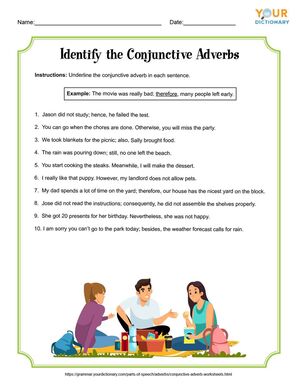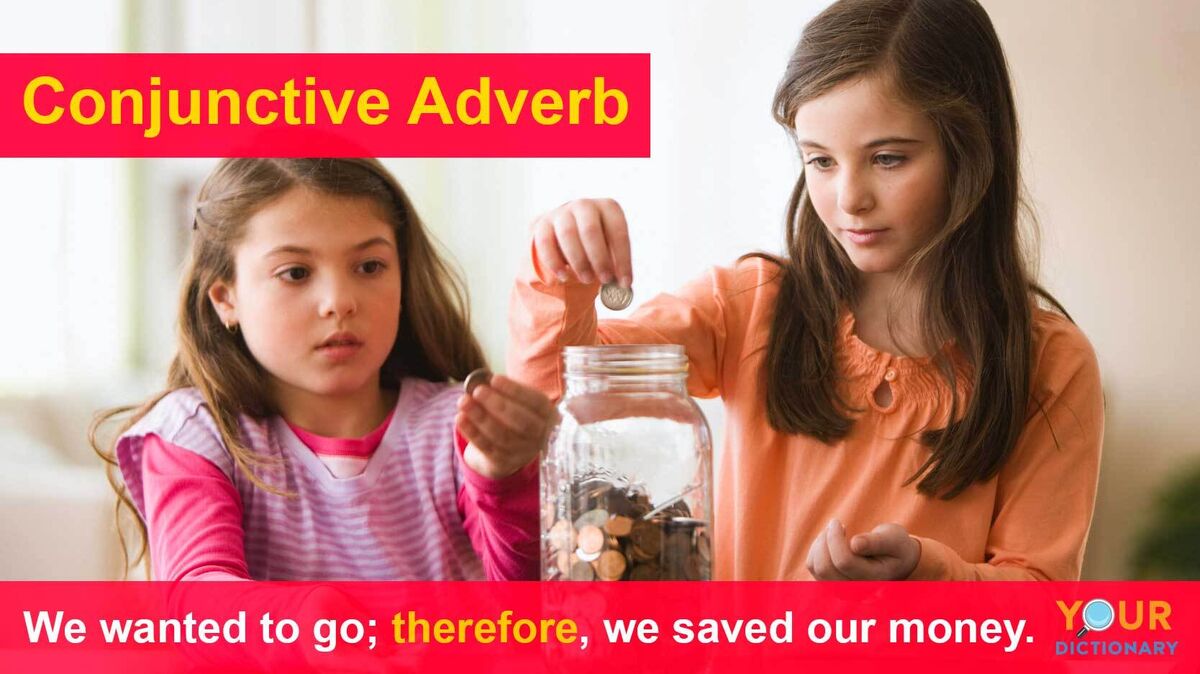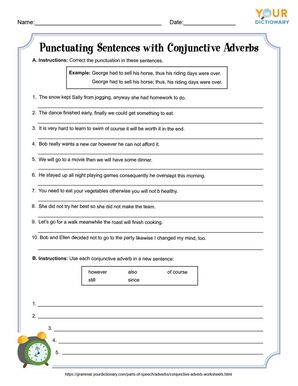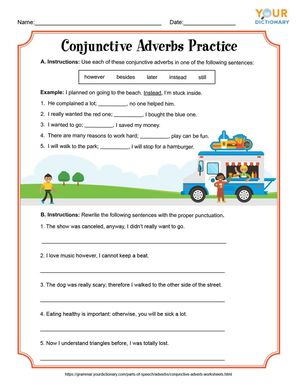

A conjunctive adverb is an adverb that functions as a conjunction – and a conjunction that functions as an adverb! It connects two independent clauses together like a conjunction, and like an adverb, it modifies the first clause with the second clause. Practice identifying and using these parts of speech with the following conjunctive adverbs worksheets.
Worksheets on Conjunctive Adverbs
Conjunctive adverbs serve several purposes. However, their main purpose is to transition from or connect to the next clause. Use these practice exercises to review what these purposes are in the context of a sentence.
Worksheet #1: Identify the Conjunctive Adverbs
The first of the worksheets will have students identifying the conjunctive adverb in sentences. You can download a printable version of the worksheet below for extra practice and additional exercises.

Identify Conjunctive Adverbs Practice
In the following sentences, identify the conjunctive adverb.
Example: The movie was really bad; therefore, many people left early.
- Jason did not study; hence, he failed the test.
- You can go when the chores are done. Otherwise, you will miss the party.
- We took blankets for the picnic; also, Sally brought food.
- The rain was pouring down; still, no one left the beach.
- You start cooking the steaks. Meanwhile, I will make the dessert.
Answers for Identify Conjunctive Adverbs Practice
Did you find all of the conjunctive adverbs? Here are the answers:
- hence
- otherwise
- also
- still
- meanwhile
Worksheet #2: Punctuating Sentences With Conjunctive Adverbs
Conjunctive adverbs put two independent clauses or sentences together and make a new sentence. The first sentence usually ends with a semicolon, and the conjunctive adverb is then followed by a comma. However, the first clause may also end in a period, and the conjunctive adverb might begin a new sentence (just like in this sentence). Using a comma instead of a semicolon or period leads to run-on sentences. Try out this exercise or print the full worksheet below.

Punctuating sentences Conjunctive Adverbs worksheet
Click to View & DownloadConjunctive Adverbs Punctuation Practice
Correct the punctuation in these sentences.
Example: George had to sell his horse; thus, his riding days were over.
- The snow kept Sally from jogging, anyway she had homework to do.
- The dance finished early, finally we could get something to eat.
- It is very hard to learn to swim of course it will be worth it in the end.
- Bob really wants a new car, however he can not afford it.
- We will go to a movie then we will have some dinner.
Answers for Conjunctive Adverbs Punctuation Practice
Check how well you did! Here are the answers for the second set of exercises:
- The snow kept Sally from jogging; anyway, she had homework to do.
(or: The snow kept Sally from jogging. Anyway, she had homework to do.) - The dance finished early; finally, we could get something to eat.
(or: The dance finished early. Finally, we could get something to eat.) - It is very hard to learn to swim; of course, it will be worth it in the end.
(or: It is very hard to learn to swim. Of course, it will be worth it in the end.) - Bob really wants a new car; however, he can not afford it.
(or: Bob really wants a new car. However, he can not afford it.) - We will go to a movie; then, we will have some dinner.
(or: We will go to a movie. Then, we will have some dinner.)
Worksheet #3: Choose the Best Conjunctive Adverb
To combine two sentences together, you use a conjunctive adverb. In the next conjunctive adverb worksheet, students choose a word that completes the sentence and recognize the proper use of punctuation. Once you’ve completed this sample exercise, download the entire worksheet for even more grammar practice.

Conjunctive Adverbs Practice worksheet
Click to View & DownloadChoose the Conjunctive Adverb Practice
Use each of these conjunctive adverbs in the following sentences: however, besides, later, instead, still. You may only use each word once.
Example: I planned on going to the beach. Instead, I’m stuck inside.
- He complained a lot; __________, no one helped him.
- I really wanted the red one; __________, I bought the blue one.
- Scott didn’t want to go on the trip; __________, he had a lot of work to do.
- Our plans fell through; __________, we’ll stay home and watch a movie.
- I will walk to the park; __________, I will stop for a hamburger.
Answers for Choose the Conjunctive Adverb Practice
Now it’s time to see if you put the conjunctive adverbs where they belong. Find the correct answers for the exercise here.
- He complained a lot; still, no one helped him.
- I really wanted the red one; however, I bought the blue one.
- Scott didn’t want to go on the trip; besides, he had a lot of work to do.
- Our plans fell through; instead, we’ll stay home and watch a movie.
- I will walk to the park; later, I will stop for a hamburger.
Conjunctive Adverbs Connect Ideas
Conjunctive adverbs are an effective way to transition between ideas. Now that you’ve had some practice with these parts of speech, print out a handy list of conjunctive adverbs to reference as you write. You can also check out these examples of comma splices that occur when you try to join two independent clauses without any conjunction at all.